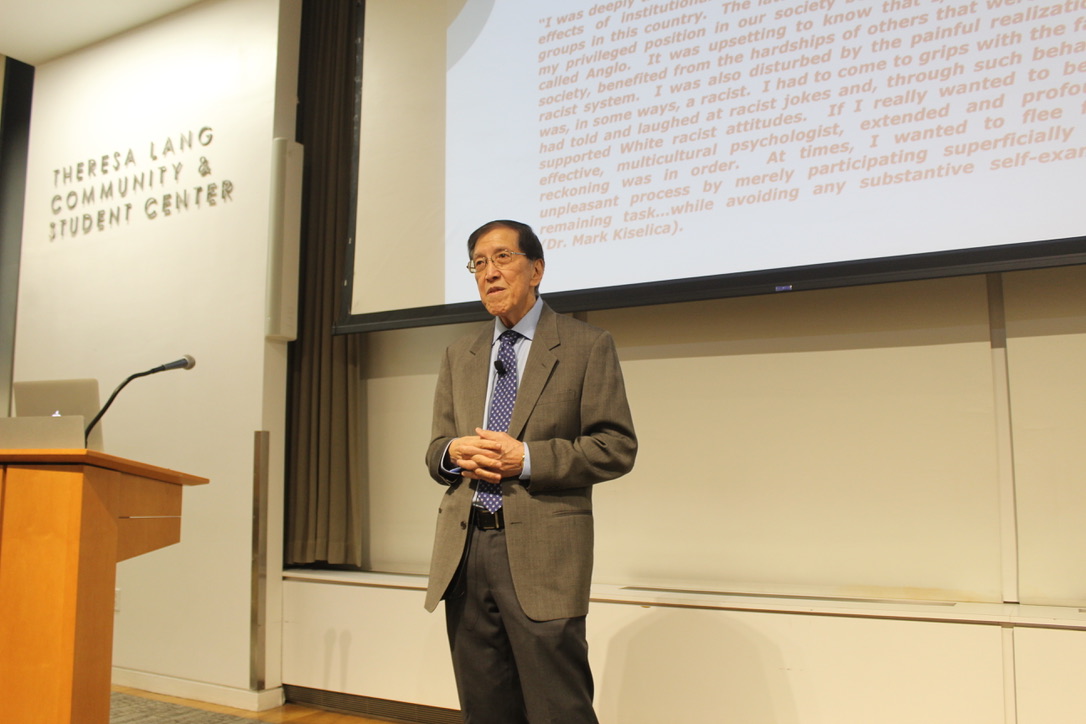“People of color are better readers of nonverbal cues than their white counterparts,” Dr. Derald Wing Sue, Ph.D., said to an intently-listening crowd of 60-something faculty, staff, students, and guests at the New School for Social Research’s “Microaggressions in Academia” event on Thursday, Oct. 17. The statement was met with nods, quiet signs of verbal agreement and snaps from audience members.
Despite its progressive image, members of the New School community that belong to minority groups are no strangers to microaggressions. For example, in May of 2018, the New School Free Press reported on an incident in which a classroom activity that involved separating students based on their skin tone made many students of color feel uncomfortable and singled out. However, this was not the only time that racial microaggressions made their way into the classroom, as made evident by Sue’s lecture.
Microaggressions in Academia event shortly before beginning. Photo by Haley Bartel
The lecture, which took place in the Theresa Lang Student Center at Arnhold Hall, was led by Sue, a professor of Psychology and Education at Columbia University and co-founder of the Asian-American Psychological Association. It was held from 6-8 p.m., but it almost ran over due to the amount of questions those in attendance had at the end of the lecture.
Though Sue acknowledged the validity of microaggressions made against women, members of the LGBTQ+ community, those with disabilities, and other minority groups, the talk focused primarily on racial microaggressions made in the classroom.
Natalia Mehlman-Petrzela, associate professor of History, asking Sue a question after the presentation. Photo by Haley Bartel
Sue began the lecture by explaining his own experience with microaggressions as an Asian-American man. For Sue, being told he spoke English well was a comment to which he would reply “I hope so, I was born here.” Correcting people would do no good.
“World views need to be changed. I can tell someone not to tell me my English is good, but their prejudices will come out in other ways,” like being asked where he was from (to which he would reply: Oregon) “These are two forms of saying they view you as a perpetual alien,” Sue said.
Sue addresses his audience. Photo by Haley Bartel
Sue received his Ph.D. in Counseling Psychology from the University of Oregon. He has published over 15 books — four of these being best-sellers, according to his profile by the Milton H. Erickson Foundation. One of these is titled “Microaggressions in Everyday Life: Race, Gender, and Sexual Orientation,” which delves into the science and psychology of microaggressions, particularly in academia. He has spent much of his career focused on the psychology of racism, partially due to his own negative experiences with racial discrimination.
Sue described racial microaggressions as “the brief and everyday slights, insults, indignities and denigrating messages sent to people of color by well-intentioned white people who are unaware of the hidden messages being communicated,” in a 2010 article for Psychology Today. Sue credits this definition to psychiatrist Chester Pierce, M.D.
He listed three types of racial transgressions that classify as microaggressions: microassaults, microinsults and microinvalidations.
Microaggressions in academia in particular are deeply rooted: they start forming as early as elementary school. In the lecture, Dr. Sue brought up how the way in which we teach history in the United States “provides white students with the belief that they are superior” and sets students of color up for failure, especially in regards to how textbooks addresses important racial issues, such as colonization and segregation, in American history.
These patterns are increased at the university level, and the New School is not exempt from them. As a predominantly white institution, students of color have less space in the classroom, which Dr. Sue addressed as a key problem in his presentation.
Second-year Lang student Andrew Orellana asking Sue a question after the presentation. Photo by Haley Bartel
“Dr. Sue really touched upon how microaggressions manifest themselves in predominantly white institutions,” said Andrew Orellana, a second-year Journalism + Design major at Lang. “They cause stress in students of color, who are regarded as angry or violent when they’re just simply speaking up on the implicit bias that these predominantly white professors and white students have when they’re talking about race.”
This lecture opened up a much bigger discussion. Sue called upon members of the New School community (specifically, white members of the New School community) to create a space in which students of color do not experience microaggressions by their white peers, and feel comfortable enough to say something when they do. Moreover, he stressed the importance of teaching white students and professors to recognize when they are acting based off of biases and committing a microaggression.







